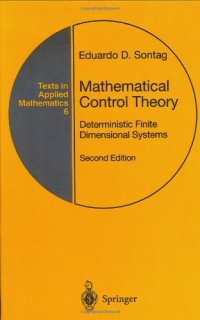
Ebook: Mathematical Control Theory: Deterministic Finite Dimensional Systems
Author: Eduardo D. Sontag (auth.)
- Genre: Mathematics
- Tags: Systems Theory Control, Calculus of Variations and Optimal Control, Optimization, Control Robotics Mechatronics
- Series: Texts in Applied Mathematics 6
- Year: 1990
- Publisher: Springer-Verlag New York
- City: New York
- Edition: 1
- Language: English
- pdf
Mathematics is playing an ever more important role in the physical and biologi cal sciences, provoking a blurring of boundaries between scientific disciplines and a resurgence of interest in the modem as well as the classical techniques of applied mathematics. This renewal of interest, both in research and teaching, has led to the establishment of the series Texts in Applied Mathematics (TAM). The development of new courses is a natural consequence of a high level of excitement on the research frontier as newer techniques, such as numerical and symbolic computer systems, dynamical systems, and chaos, mix with and rein force the traditional methods of applied mathematics. Thus, the purpose of this textbook series is to meet the current and future needs of these advances and to encourage the teaching of new courses. TAM will publish textbooks suitable for use in advanced undergraduate and beginning graduate courses, and will complement the Applied Mathematics Sci ences (AMS) series, which will focus on advanced textbooks and research-level monographs. v Preface This textbook introduces the basic concepts and results of mathematical control and system theory. Based on courses that I have taught during the last 15 years, it presents its subject in a self-contained and elementary fashion. It is geared primarily to an audience consisting of mathematically mature advanced undergraduate or beginning graduate students. In addi tion, it can be used by engineering students interested in a rigorous, proof oriented systems course that goes beyond the classical frequency-domain material and more applied courses.
This textbook introduces the basic concepts and results of mathematical control and system theory. It is geared primarily to an audience consisting of mathematically advanced undergraduate or beginning graduate students. In addition it can be used by engineering students interested in a rigorous, proof-oriented systems course that goes beyond the classical frequency-domain material and more applied courses. The minimal mathematical background that is required of the reader is a working knowledge of linear algebra and differential equations. The book covers what constitutes the common core of control theory: the algebraic theory of linear systems, including controllability, observability, feedback equivalence, and minimality; stability via Lyapunov, as well as input/output methods; ideas of optimal control; observers and dynamic feedback; parameterization of stabilizing controllers (in the scalar case only); and some very basic facts about frequency domain such as the Nyquist criterion. Kalman filtering is also introduced briefly through a deterministic version of "optimal observation. This text is unique in its emphasis on foundational aspects. While covering a wide range of topics written in a standard theorem/proof style, it also develops the necessary techniques from scratch and does not assume any background other than basic mathematics. In this second edition, additional chapters and sections have been written dealing with time optimal control of linear systems, variational and numerical approaches to nonlinear control, nonlinear controllability via Lie-algebraic methods, and controllability of recurrent nets and of linear systems with bounded controls. A large number of errors and typos have been corrected, and a table of symbols has also been added. "This book will be very useful for mathematics and engineering interested in a modern and rigorous systems course, as well as for the experts in control theory and applications. " Mathematical Reviews